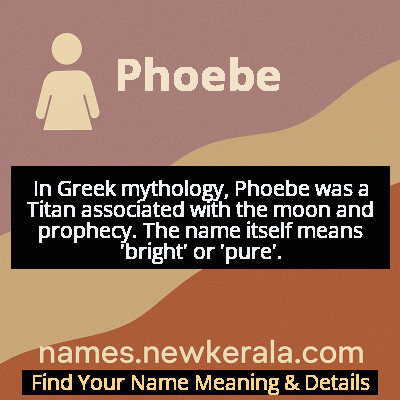Phoebe Name Meaning & Details
Origin, Popularity, Numerology Analysis & Name Meaning of Phoebe
Discover the origin, meaning, and cultural significance of the name PHOEBE. Delve into its historical roots and explore the lasting impact it has had on communities and traditions.
Name
Phoebe
Gender
Female
Origin
Greek
Lucky Number
6
Meaning of the Name - Phoebe
In Greek mythology, Phoebe was a Titan associated with the moon and prophecy. The name itself means 'bright' or 'pure'.
Phoebe - Complete Numerology Analysis
Your Numerology Number
Based on Pythagorean Numerology System
Ruling Planet
Venus
Positive Nature
Harmonious, responsible, caring, and artistic.
Negative Traits
Overly idealistic, superficial, possessive, or jealous.
Lucky Colours
Pink, turquoise.
Lucky Days
Friday.
Lucky Stones
Diamond, turquoise.
Harmony Numbers
2, 3, 9.
Best Suited Professions
Artists, musicians, teachers, healthcare workers.
What People Like About You
Warmth, nurturing nature, artistic flair.
Famous People Named Phoebe
Phoebe Waller-Bridge
Actress/Writer
Created and starred in Fleabag, winning multiple Emmy Awards
Phoebe Cates
Actress
1980s film star known for Fast Times at Ridgemont High and Gremlins
Phoebe Snow
Singer
Grammy-nominated folk-jazz singer famous for 'Poetry Man'
Phoebe Tonkin
Actress
Australian actress known for The Vampire Diaries and The Originals
Name Variations & International Equivalents
Click on blue names to explore their detailed meanings. Gray names with will be available soon.
Cultural & Historical Significance
Extended Personality Analysis
People named Phoebe typically exhibit a fascinating blend of creativity and intellect that makes them both imaginative and analytical. They often possess strong intuitive abilities and emotional intelligence, allowing them to understand complex social dynamics and connect with others on deep levels. Many Phoebes demonstrate artistic talents or creative problem-solving skills, combined with a practical sensibility that helps them implement their innovative ideas. Their mythological association with the moon suggests personalities that are reflective, adaptable to changing circumstances, and capable of illuminating hidden truths. They tend to be independent thinkers who value authenticity and often develop unique personal styles or unconventional approaches to life. While they can be deeply thoughtful and introspective, they also typically possess a warm, engaging presence that draws people to them. This combination of depth and approachability makes Phoebes often sought after as friends, creative collaborators, and trusted advisors.
Modern Usage & Popularity
In contemporary naming trends, Phoebe has established itself as a sophisticated yet accessible choice that bridges classical elegance with modern appeal. Since the 1990s, the name has maintained consistent popularity across English-speaking countries, particularly in the United Kingdom where it frequently ranks within the top 100 girls' names. In the United States, it has shown steady growth, reflecting broader trends toward mythological and celestial names. The name's current appeal lies in its perfect balance of historical gravitas and contemporary freshness - it feels both timeless and current. Demographic analysis shows particular strength among urban, college-educated parents who value names with literary and historical significance. The Friends character undoubtedly boosted its mainstream recognition, but the name has sustained popularity beyond that initial cultural moment, suggesting enduring appeal. Current usage patterns indicate Phoebe works well across diverse social and economic backgrounds, appreciated for its melodic sound, positive associations, and the appealing combination of strength and gentleness it conveys.
Symbolic & Spiritual Meanings
Symbolically, Phoebe represents multiple layers of meaning that have evolved across centuries while maintaining core associations with light and purity. As a lunar figure, she embodies the symbolism of the moon itself - intuition, cycles, reflection, and the feminine principle. The moon's light is reflected rather than generated, symbolizing wisdom that comes from observation and understanding rather than brute force. This connects to Phoebe's mythological role as a Titan of intellect, representing the illuminating power of knowledge and clarity of thought. The name also carries associations with prophecy and foresight, given her mythological connections to the Oracle of Delphi. In psychological terms, Phoebe symbolizes the integration of conscious and unconscious mind, the balance between logical thought and intuitive understanding. Modern symbolic interpretations often emphasize the name's representation of individuality and authenticity - the courage to be uniquely oneself while illuminating paths for others. The celestial connection also suggests guidance and protection, making Phoebe a name that symbolizes both inner strength and the capacity to nurture and inspire those around her.

